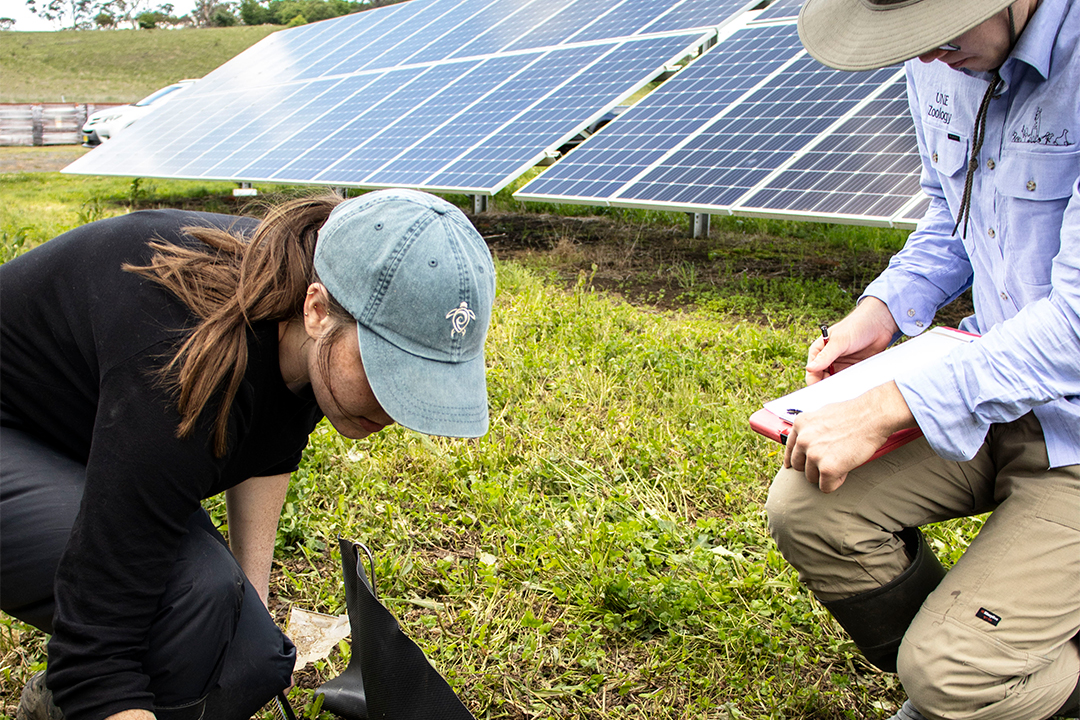Did you know UNE has a Renewable Energy Hub? Created by Senior Lecturer in Zoology and Ecology, Dr Eric Nordberg, the hub consists of 20 like-minded academics who are working hard to ensure our shift to a renewable future works hand-in-hand with the nation’s biodiversity conservation efforts.
For World Environment Day (Monday June 5th), we had a chat with Dr Nordberg about the Renewable Energy Hub, and some of the other important work that UNE is doing in this space.
What is the purpose of the renewables hub and how did it come about?
The Renewable Energy Hub is a collection of academics and researchers with a shared interest in renewable energy, spanning multiple disciplines at UNE, including business, law, engineering, agriculture, ecology, biodiversity, agronomy, soil sciences, just to name a few. I have been interested in the management and impacts renewables (particularly solar farms) have on the environment and biodiversity, and when I realised UNE didn’t have a group dedicated to this field, I put out a call to create a hub of expert knowledge to share ideas, create collaborative projects, and connect networks throughout the region.
Who is involved?
The hub is open to anyone who has interest in the renewable space. At the moment, we have about 20 people (not including their students) in the Hub with expertise in the areas of biodiversity and conservoltaic systems, environmental impact assessments, soil and plant sciences, animal sciences, agronomy, agriculture and agrivoltaic systems, economics, rural energy policy, law, legislation and regulation, materials and product design, pollution and waste management.
Why is this an important area to put research and resources into? What are some areas of renewables that need more research and attention?
The New England Tablelands have been identified as a Renewable Energy Zone by the Australian Government, and we can already see multiple large-scale solar projects in the region. However, we don’t have a great understanding of what impacts solar farms have on the environment. From an ecological prospective, it’s not clear if solar farms can provide suitable habitat for wildlife and native vegetation, or the best way to use solar farms for multiple purposes, such as grazing under panels as a vegetation management service for the solar farm but also to provide forage for sheep.

Image: A frog found during a survey of UNE's on-campus solar farm.
How is UNE addressing this?
UNE has a solar farm at the northern end of the Armidale campus which is being used for teaching and research to begin to answer some of these questions. We are currently comparing vegetation, invertebrate, and vertebrate communities in the UNE solar farm and comparing it to the adjacent Laureldale SMART farm to see the impacts solar farm construction and management has on biodiversity. Although the UNE solar farm is small compared to some of the large-scale farms in the area, it provides a perfect pilot study for students to get involved in research and to present an opportunity to collect some baseline data before expanding to larger sites in the area.
What are your plans for the future of the Hub?
I hope to get some large-scale solar farms on board for research projects at UNE. A variety of different projects could be run simultaneously on any given solar farm (with projects looking at plants, soil, wildlife, energy efficiency, etc.) that we could really learn a lot from such collaborative projects. New renewable projects are being approved and built at an alarming rate, so if we want to be able to inform renewable companies on how they can improve land condition under panels, or how to minimise the negative impacts on biodiversity, we need to jump on these opportunities ASAP.
What are some of our degrees and courses that students can study if they're interested in this field?
At this stage UNE doesn’t have any renewable energy specific units or courses, but many of our units have begun to include renewable sites into field trips, pracs, or as case studies throughout the unit. Currently, ECOL204 – Ecological Methods, ZOOL310 – Techniques in Zoology, EM351 – Environmental Rehabilitation, and ENGT237 – Local Environmental Infrastructure visit solar farms for various hands-on activities. With the growing interest in the field of renewables, we hope to put together additional units, courses, diplomas, or degrees in the near future.
If you work for a renewable energy company and are interested in research partnership, please contact Dr Eric Nordberg.


